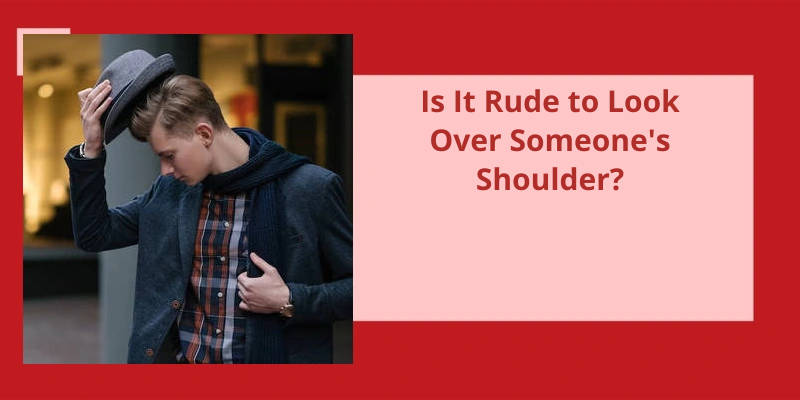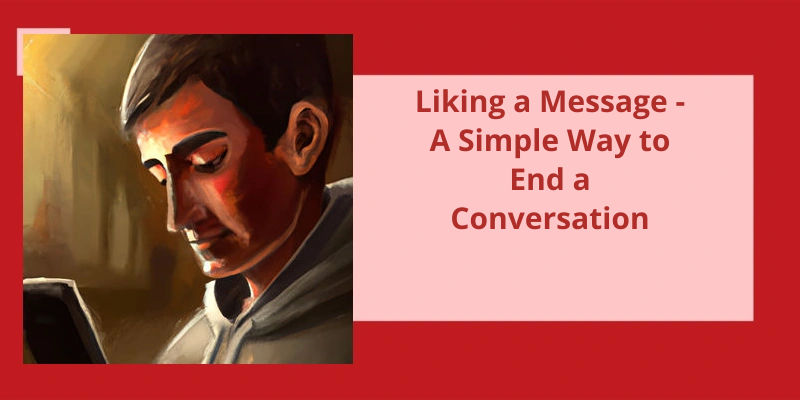Is it rude to look over someone's shoulder? The answer is a resounding yes. It isn’t only rude, but also intrusive and disrespectful to the person. Consider for a moment the invasion of personal space and privacy that occurs when one chooses to peer over another's shoulder. It’s a blatant disregard for boundaries and an unwelcome intrusion into someone's personal activities. Moreover, it begs the question: why on earth would you even think about doing such a thing? What purpose does it serve, other than satisfying one's curiosity or nosiness? While the intentions behind looking over someone's shoulder may vary, the consequences remain the same – it’s an act that can lead to not just discomfort, but also a potentially unpleasant verbal encounter with the aggrieved party. Therefore, it’s best to refrain from engaging in this impolite and ill-mannered behavior, and to always respect the personal space and privacy of others.
What Does He Looked Over His Shoulder Mean?
When we say that someone is looking over their shoulder, we’re referring to a state of constant anxiety and fear about potential actions or threats from others. This phrase implies that the person feels the need to constantly be on guard and aware of their surroundings, anticipating any possible harm or negative consequences that may come their way.
People who tend to look over their shoulder may find it difficult to trust others and often have heightened suspicions about peoples motives or intentions. They may also display an increased level of caution and take additional safety measures to protect themselves from potential harm.
While this sense of constant vigilance can be a natural response to previous negative experiences, it can also interfere with ones ability to fully enjoy and engage with daily life. The individual may become overly preoccupied with their fears and anxieties, making it challenging to form meaningful connections with others or fully trust anyone in their personal or professional life.
It’s important to note that looking over ones shoulder isn’t necessarily an indication of rudeness or deliberate mistrust towards others. Instead, it’s a defensive mechanism that individuals employ as a means of self-protection and self-preservation. Understanding and empathy can help create a safe and supportive environment for individuals who constantly feel the need to look over their shoulder.
Looking over your right shoulder is a crucial part of safe driving. It allows you to check for any objects or vehicles in your blind spot, ensuring that you’ve a clear view before changing lanes or overtaking. This quick glance over your right shoulder can prevent accidents and help you maintain situational awareness on the road.
What Does It Mean to Look Over Your Right Shoulder?
Is It Rude to Look Over Someones Shoulder?
The act of looking over someones shoulder can be considered impolite and invasive. It’s commonly perceived as a breach of personal space and can make the person being observed feel uncomfortable or even violated. This behavior is often associated with eavesdropping or trying to gain unauthorized access to someones information, which adds to the negative connotations. When engaging in social interactions, it’s generally expected to maintain a respectful distance and refrain from intruding on someones privacy.
In the context of safety, such as when performing a right shoulder check while driving, it’s essential to ensure that there are no blind spots or potential hazards. This type of surveillance isn’t meant to invade someones privacy but rather to protect oneself and others, demonstrating the importance of considering the intention and context behind the act.
Similarly, in certain collaborative or educational settings, looking over someones shoulder can be encouraged and positively received. For example, in a classroom, a teacher may oversee a students progress or provide guidance by monitoring their work. In this context, the act of observing supports learning and growth rather than invading someones privacy.
It’s crucial to respect personal boundaries and privacy, and only engage in this behavior when there’s a legitimate reason, such as safety concerns or collaborative learning environments. It’s essential to consider the context and intention behind the act to ensure it isn’t offensive or intrusive.
Source: Right Shoulder Check definition – driveJohnson’s
While placing a hand on someone’s shoulder can convey affection and closeness when done by a close friend or family member, it can also be interpreted as a means of asserting authority or control in certain circumstances.
What Does It Mean When Someone Puts Their Hand Over Your Shoulder?
Curiosity or interest: When someone puts their hand over your shoulder, it could also be a gesture of curiosity or interest. Perhaps they want to get a better look at something youre doing or talking about. This action might indicate that they’re genuinely engaged in the conversation or activity and want to be involved.
Comfort or reassurance: Another reason someone might put their hand on your shoulder is to provide comfort or reassurance. This could be in response to a difficult or challenging situation, where the person wishes to offer support or empathy. By placing their hand on your shoulder, they’re showing compassion and letting you know that they’re there for you.
Encouragement or motivation: In some contexts, the action of placing a hand on someones shoulder can be a way to provide encouragement or motivation. It can signal that the person believes in your abilities and wants to give you that extra push to succeed. This gesture can be particularly helpful in professional or educational settings where guidance and support are valued.
Asserting dominance or intimidation: Unfortunately, there can be instances where placing a hand on someones shoulder is an act of asserting dominance or intimidation. It can be used as a power play or a way to manipulate and control the other person. In such cases, the action may not be consensual or respectful, and it’s important to address such behavior.
Nonverbal communication: Lastly, touching someones shoulder can be a form of nonverbal communication. It can convey various emotions, such as affection, authority, curiosity, or empathy, depending on the situation and the relationship between the individuals involved. Understanding the context and the nature of the relationship can help determine the true intention behind the gesture.
Reading over someone’s shoulder refers to the act of surreptitiously reading or watching what someone else is reading or doing, usually without their consent. It involves standing behind or next to a person and observing their written or visual content, such as a book, article, or screen, without actively participating or engaging in a conversation with them. This behavior can be seen as intrusive, disrespectful, or nosy, particularly if the person being observed is unaware or uncomfortable with such close scrutiny.
What Does Reading Over My Shoulder Mean?
Reading over someones shoulder typically refers to the act of standing or sitting behind someone and reading the material they’re reading without their consent. It’s often seen as intrusive and disrespectful behavior, as it invades the persons privacy and personal space. This can apply to various forms of reading material, such as books, newspapers, magazines, or even electronic devices like laptops or tablets.
It’s important to remember that everyone has the right to privacy and should be given the courtesy to read without feeling observed or judged.
While curiosity may be a natural human trait, it’s essential to recognize and respect the boundaries of others. Instead of reading over someones shoulder, it’s more appropriate to engage in open communication and ask for their permission if you’re genuinely interested in what they’re reading. Respecting personal space and privacy is crucial in maintaining healthy relationships and fostering a sense of trust and mutual respect.
It invades a persons privacy and personal space, making them feel uncomfortable and violated. Respecting boundaries and obtaining consent are vital in maintaining positive social interactions and fostering trust. Ultimately, treating others with respect and consideration is key to building strong and healthy relationships.
Shoulder checking, commonly practiced while driving or biking in Canada and the US, refers to the act of looking over one’s shoulder to the rear before making a lane change or turning. This precautionary measure allows individuals to detect any vehicles in their blind spots, ensuring safer maneuvering on the roads.
What Is the Meaning of Shoulder Checking?
Shoulder checking, primarily used in Canada and the United States, refers to the act of glancing backwards over ones shoulder while driving or biking. This action is typically done before changing lanes or making a turn in order to check for any vehicles that may be in ones blind spots. It’s considered an essential defensive driving technique to ensure the safety of both the driver and others on the road.
In the context of driving etiquette, it’s important to note that shoulder checking while changing lanes or making a turn shouldn’t be mistaken as rude or invasive behavior. Instead, it’s a necessary and responsible action that promotes safety and awareness on the road. It’s crucial for drivers and cyclists to respect one anothers space and be mindful of other road users blind spots when maneuvering on the streets.
It allows individuals to proactively identify potential hazards and ensure the safety of all road users.
Tips on How to Properly Shoulder Check While Driving or Biking
- Make sure to turn your head and look over your shoulder in the direction you’re turning.
- Check for any vehicles, pedestrians, or cyclists in your blind spot.
- Use your mirrors to get a general idea of your surroundings, but always confirm with a shoulder check.
- Signal your intention to change lanes or make a turn before shoulder checking.
- Shoulder check before opening your car door to avoid hitting cyclists or pedestrians.
- Practice shoulder checking regularly to develop good habits and improve your awareness on the road.
- Be cautious and take your time when shoulder checking, especially in heavy traffic or complex intersections.
- Remember to shoulder check in both directions if you’re changing lanes or making a U-turn.
- Keep in mind that shoulder checking is essential for safety and helps prevent accidents.
Conclusion
This behavior is intrusive and disrespectful, as it invades the personal space and privacy of the individual. Beyond the obvious breach of boundaries, it’s important to consider why one would even entertain the idea of peeking at someone else's screen or reading their private messages. Such actions display a lack of empathy and disregard for the feelings of the person on the receiving end. It’s crucial to remember that everyone is entitled to their own space and the freedom to engage in personal activities without unwarranted scrutiny. Not only is it impolite, but it also opens the door to potential conflict and confrontation, as the person being observed may understandably react negatively to such invasive behavior. Instead of prying into someone's business, let’s uphold the values of respect and decency, allowing individuals to feel comfortable and secure in their personal space.






